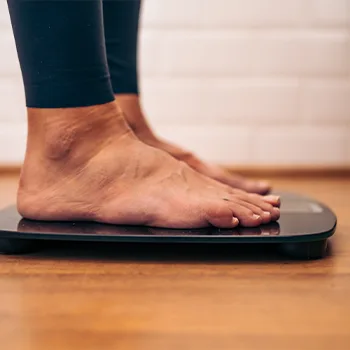So many of my new clients come to me with the question of what realistic weight loss goals would be for them. And as a personal trainer, it's always a difficult answer because some people are more eager and motivated than others.
From my experience and research, I can say that it is possible to achieve successful weight loss of two pounds per week on a consistent basis.
I have managed to guide many people through this process with the help of my good friend and dietitian, Susan. And we've decided to put all that information into this blog post.
Let's dive right in.
Quick Summary
- To lose 2 pounds a week, a combination of a healthy diet and consistent strenuous workouts is necessary.
- Eliminating junk food, processed meals, and simple carbohydrates can significantly enhance the likelihood of losing at least 2 pounds weekly.
- A study by the National Institutes of Health reveals that High-Intensity Interval Training (HIIT) effectively reduces abdominal visceral fat area by 9.1 cm².
- In my opinion, creating a balanced approach between diet and exercise is vital for sustainable weight loss; overemphasis on either can hinder progress.
What Does It Take To Lose 2 Pounds A Week?

To lose 2 pounds a week, it takes a combination of managing your calorie intake and incorporating regular exercise into your routine. Creating a calorie deficit by consuming fewer calories than your body needs can lead to weight loss while preserving lean muscle mass.
It takes a powerful combination of careful dieting and strenuous exercising to lose 2 pounds a week [1]. Susan and I both agreed that the combination comes down to 70% diet and 30% exercise.
And that 70% is where most people make the most significant mistakes. They simply decide to count how many calories they eat and bring that number down.
According to a 2023 article published in WebMD, it's a lot more about where those calories come from than just aiming for an exact number [2].
And as far as the exercising goes, just hammering out endless hours doing the exact same workout or cardio session isn’t going to work.
Is Reducing Your Calories Enough To Lose 2 Pounds A Week?

No, reducing your calorie intake is not sufficient to lose 2 pounds a week. It is essential to focus on healthy eating habits, prioritize whole foods, and manage carb intake for effective weight loss.
From my experience, tweaking eating habits plays a big role; it is crucial to prioritize whole grains, avoid processed foods, create a caloric deficit, and address any potential nutrient deficiencies in your perfect plan to lose two pounds a week.
But it's a lot more important to look at your eating habits and the types of calories you're taking in.
Here's what I mean. It takes the body quite some time to break down and absorb fat and protein, but carbs are the primary easy access fuel.
And simple carbs, or high glycemic carbs, are very easy to absorb, causing sudden blood sugar spikes. So, a calorie deficit to lose weight has to ideally focus on reducing the calories from simple carbs [3].
"All carbohydrates are broken down into sugar, or glucose, which is the body's fuel. Carbohydrates with little fiber break down quickly. Those foods with carbohydrates trapped in fiber take longer to break down."
- John Casey, Writer at WebMD.com
How Much Will Your Diet Influence Losing 2 Pounds A Week?

Your diet plays a significant role in achieving a consistent weight loss of 2 pounds a week, accounting for about 70% of your success in this endeavor.
Now, I have to be careful to point out that there are so many fad diets. And I'm not just referring to the crazy things like the chipotle diet. Yes, that's actually a thing.
Here are two tips that could make up the majority of your diet improvement.
Cut Out Processed And Junk Food
Far too many people completely rely on processed food. And this isn't just junk and fast food like burgers, fries, and pizzas. Next time you do your grocery shopping, take a look at what you buy and think about how much effort will go into preparing the meal.
If it's straight to the oven, frying pan, microwave, or onto a plate, then it's processed, and it'll be a major obstacle towards losing two pounds a week.
Cut Out Simple Carbs
According to a study by the National Institutes of Health (NIH), simple and highly processed carbs are a major contributor to weight gain and obesity. These are predominantly sugary carbs, but you'll also find them in highly refined grains like pasta, white bread, most breakfast cereals, and juices [4].
Next, let's talk about the importance of a calorie deficit to lose fat.
How Much Do You Need To Exercise To Lose 2 Pounds A Week?
To lose 2 pounds a week, a combination of regular exercise and a balanced diet is essential. Exercise involves being active five days a week, combining gym and outdoor activities for variety and motivation.
Try weight training, high-intensity interval training, and cardio each on separate days. Spend the remaining 2-3 days doing enjoyable outdoor activities like long walks or short runs.
Varied exercises prevent boredom and avoid hitting a weight loss plateau by keeping muscles and metabolism active [5].
Related Post: How to Burn off Carbs More Quickly
What Types Of Exercises Should You Consider?

You should consider incorporating a variety of exercises into your routine, including High-Intensity Interval Training (HIIT), strength training, and cardio, in order to prevent workout monotony and maximize fat-burning potential.
High-Intensity Interval Training (HIIT)
HIIT for weight loss is one of my top recommendations for people who want to lose body fat. You can make it a great combination of cardio and weight training, and because you can switch out the exercises regularly, you're less likely to get bored.
A pivotal study by the National Institutes of Health (NIH) found that HIIT may help people deal more effectively with belly fat [6].
Strength Training
I'm not suggesting that you aim to become a ripped bodybuilder. But building up muscle strength will help you increase your basal metabolic rate. Essentially, the more muscle mass you have, the more your body will burn calories while at rest [7].
Cardio
It's wrong to assume that weight loss programs with just cardio will result in sustainable fat reduction. But there is always scope for some cardio, even if it's light cardio to add activities for two less intense days of the week [8].
The important thing is that you don't want your body to get used to the same exercise and strain week in and week out.
You May Also Like: 15 Best Cardio Workouts for Weight Loss
Creative Ideas To Boost Your Chances Of Losing 2 Pounds A Week

Here are six creative ways to make your calorie deficit goal more achievable.
- Rewards for Gym Sessions: Set weekly exercise goals with rewards for achieving them, like a spa visit or a healthy restaurant meal.
- Smart Eating Out: Be mindful of carbs when dining out and choose restaurants with healthier options.
- Understand Your BMR: With a simple BMR calculator, you'll understand how much energy your body needs, excluding physical exercise [9].
- Stay Hydrated: Hydration can boost your resting metabolic rate, aiding weight loss [10].
- Healthy Snacks: Opt for fresh fruits, seeds, and nuts over high-calorie sugary snacks.
- Weight Loss Supplements: No, I'm not talking about dodgy magic pills you see advertised. There are perfectly legitimate fat burner supplements for men and women that help you create a slightly larger calorie deficit to lose weight faster.
Related Article: How To Lose 30 Pounds In A Month
FAQs
Is It Realistic to Lose 2 Pounds a Week?
Yes, it is realistic to lose 2 pounds a week. You can achieve successful weight management with a healthier lifestyle, diet, and exercise routine. But it's difficult to sustain the necessary choices to make a lasting impact.
What Exercises Burn The Most Calories?
High-intensity interval exercises burn the most calories. These drive your heart rate up high and aim to maintain that intensity for longer periods. The result is a more sustained metabolic rate and a higher caloric deficit.
What Are the Biggest Weight Loss Mistakes?
The biggest weight loss mistakes include:
- Extreme diets or severe calorie restriction.
- Skipping meals or not eating enough.
- Overemphasis on fad diets or quick fixes.
- Lack of portion control and mindless eating.
- Not staying consistent with exercise.
- Ignoring the importance of sleep and stress management.
- Relying solely on supplements for weight loss.
- Setting unrealistic or unsustainable goals.
References:
- https://www.mayoclinic.org/healthy-lifestyle/weight-loss/in-depth/weight-loss/art-20047752
- https://www.webmd.com/diet/lose-weight-fast
- https://www.webmd.com/diet/features/carbs-for-weight-loss#1
- https://www.ncbi.nlm.nih.gov/pmc/articles/PMC5664675/
- https://www.mensjournal.com/health-fitness/5-ways-to-long-term-fitness-success
- https://www.ncbi.nlm.nih.gov/pmc/articles/PMC5237463/
- https://www.self.com/story/how-much-does-strength-training-really-increase-metabolism
- https://www.shape.com/fitness/workouts/8-cardio-myths-are-making-you-fat
- https://www.active.com/fitness/calculators/bmr
- https://www.weekand.com/healthy-living/article/hydration-affect-metabolism-18013662.php
About The Author
You May Also Like





